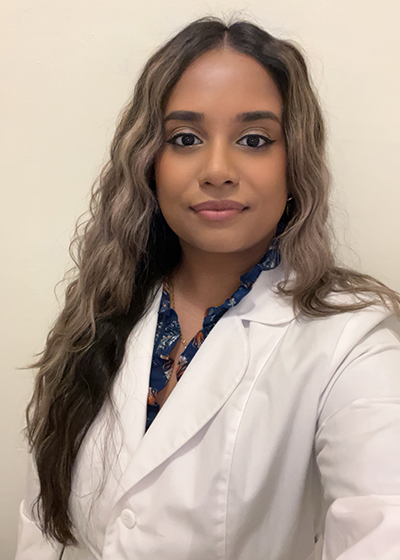Class of '24: Helping create a healthier community is her goal
 Each year, University of Detroit Mercy’s Marketing & Communications department profiles members of the graduating classes. Students chosen were nominated by staff and faculty for their contributions to the life of the University.
Each year, University of Detroit Mercy’s Marketing & Communications department profiles members of the graduating classes. Students chosen were nominated by staff and faculty for their contributions to the life of the University.
Afsana Uddin has been attending classes at University of Detroit Mercy since 2012.
“I’ve grown up here,” she joked.
This year, she will graduate with a doctorate in Nursing Practice, after having earned a bachelor’s degree in Nursing and a graduate degree in Family Nurse Practitioner.
Uddin’s parents emigrated to the United States from Bangladesh and didn’t have a high school education. She is the third of their three children to receive an advanced degree and their first to receive a doctorate. She followed her two sisters to Detroit Mercy, where her nephews are also students.
“There were so many factors as to why I chose Detroit Mercy,” said the native of northwest Detroit. “I liked the closeness, I loved that we’re embedded in the city of Detroit, I like the small campus because we have access to professors and other resources to help us.”
But it was the service learning programs that truly inspired her. Her participation in the Fresh Incentive program helped her see that good health starts long before a person needs a doctor.
“When you work in the community, you get to see and be exposed to things you didn’t know about and that can affect a person’s health,” Uddin said. “And it meant a lot that we were working right in the Fitzgerald neighborhood.”
Fresh Incentives began at Eastern Market and delivered fresh fruits and vegetables to people in Detroit neighborhoods who don’t have ready access to healthy foods. Funding through the Ford Community Corps Foundation paid to purchase fresh fruits and vegetables expand the program to the Fitzgerald neighborhood.
Access to food and education on taking care of your health are the two largest barriers to eating well.
“Going into this, we thought that access to food would be a major deterrent,” Uddin said for a story about the early days of the program. “We are learning that education is a big part of that as well.”
She expanded the work for her doctoral studies, introducing physical activity modules to get people moving. It was the first project where students entered the homes of the people they serve and it was eye-opening to her.
The results were very positive. People lost weight, which led to benefits like lower blood pressure and the ability to exercise more. Working in homes led to connections and students, led by Uddin, expanded goals to decreasing intake of soda and salty snacks. They created a map of the many farmers markets nearby so people knew where to go to get fresh food.
“There were positive outcomes on so many different levels,” she said. “It is a really important program.”
Uddin hopes to introduce the model to the home care company she has worked at for two years.
When not in class as a student, Uddin serves as an adjunct professor in the McAuley School of Nursing.
Her passion for spreading the word about healthy eating to populations that don’t have that history has been a very welcome surprise.
“I originally had no plans about doing something like this,” she said. “But I’m so glad it found me.”
— By Ron Bernas. Follow Detroit Mercy on Facebook, LinkedIn, X and Instagram. Have a story idea? Let us know by submitting your idea.
